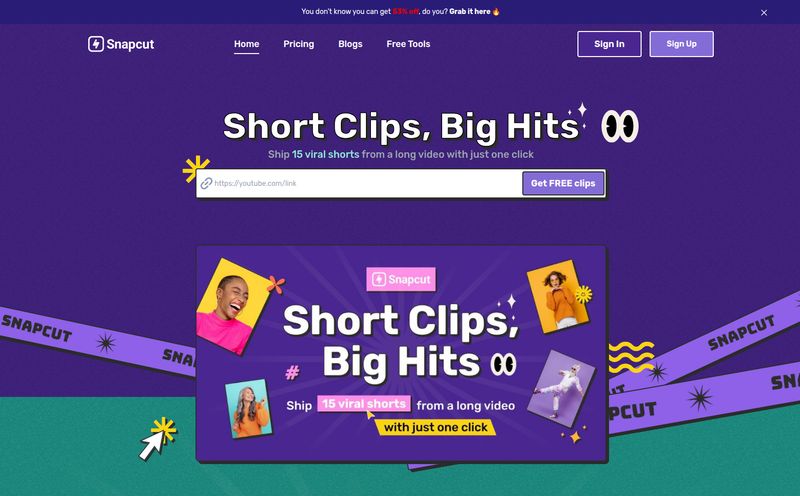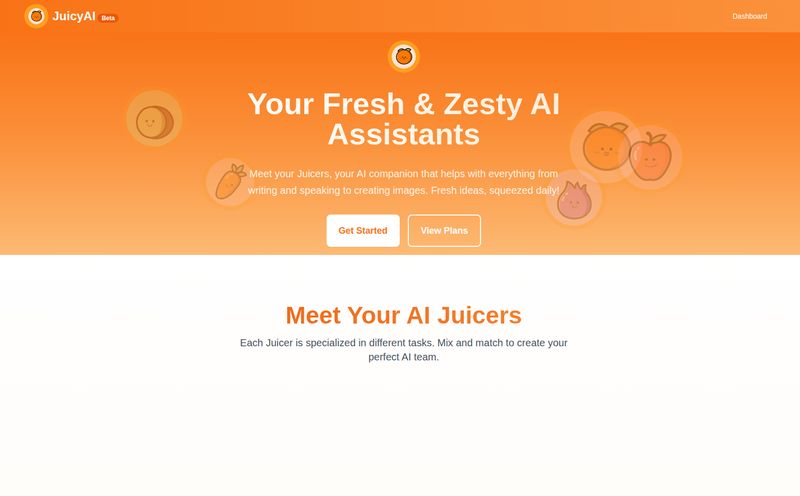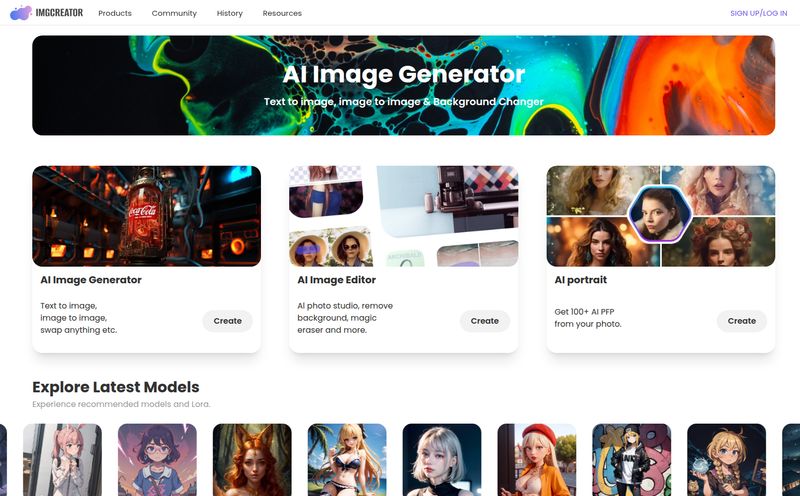If you're like me, your feeds are probably clogged with a never-ending stream of AI-generated madness. From the jaw-dropping realism of OpenAI's Sora to the quirky, sometimes nightmarish clips from Pika Labs, the text-to-video space is the new wild west. Everyone’s scrambling to stake their claim. I’ve been playing with every AI video tool I can get my hands on, and just when I thought I had a handle on the key players, another one pops up on my radar. This one, though, feels a little different.
It’s called Jimeng AI. And the most interesting thing about it isn't just what it does, but who's behind it. The trail leads back to Faceu Technology, the same folks who brought us CapCut. Yes, that CapCut. The video editor that’s practically taken over every phone on the planet. Suddenly, this isn't just another startup. This is a move from a giant.
So, What Exactly is Jimeng AI?
At its core, Jimeng AI is a text-to-video and image-to-video model. You give it a text prompt or a static picture, and it spits out a short video clip. Standard stuff for 2024, right? But the devil, as they say, is in the details. The platform claims to be a "One-Stop AI Creation Platform," which is a bold statement, but given its parentage, it might have the chops to back it up.
The whole idea is to make video creation fast and intuitive. We're talking about turning a simple idea—a fleeting thought, a cool image you generated—into a moving scene in minutes. And they’re not just targeting the English-speaking world; one of its standout features right out of the gate is its native support for Chinese prompts. A smart move, considering the massive market.

Visit Jimeng AI
The Features That Made Me Raise an Eyebrow (In a Good Way)
I've seen a lot of AI tools that are one-trick ponies. They do one thing okay, and that's it. Jimeng seems to be aiming for a more complete toolkit, which gets my attention.
The Director's Chair: Camera Control and Precision
This is the big one for me. So many early AI video tools give you a static, locked-off shot. It's cool, but it feels... well, robotic. Jimeng AI emphasizes "smooth camera movement" and "precise control" from the first frame to the last. This is huge. The ability to dictate a pan, a zoom, or a dolly shot is what separates a sterile clip from a piece of cinematic storytelling. It suggests you're not just a prompter; you're a director. I haven't seen the full extent of this control yet, but the very promise of it is exciting. It’s the difference between telling an actor to “stand there” and giving them actual blocking.
The Mysterious 'Smart Canvas'
Okay, the marketing language here is a bit... funky. The site talks about a "Smart Canvas for Multi-Image AI Fusion." After poking around, it seems to be a feature that lets you combine multiple images into a cohesive, animated scene. Think of it like a digital collage board that suddenly wakes up and starts moving. You could take a character from one image, a background from another, and have the AI generate a video that blends them. This could be an incredible tool for artists and creators who want to build more complex scenes without having to cram everything into a single, overloaded text prompt. It feels like a step towards more intentional, layered creation.
No Lost in Translation Moments
The explicit support for Chinese writing is more significant than it sounds. It shows an awareness of a global user base and likely means the model has been trained on a different, more diverse dataset. For anyone creating content for the Asian market, this is a game-changer. No more awkward translations or hoping a model understands the cultural nuance of your prompt.
The CapCut Connection: Why This Is a Big Deal
Let's be real for a second. The AI space is full of vaporware and half-baked tools that disappear after a few months. The fact that Jimeng AI comes from the ByteDance ecosystem (the parent company of TikTok and CapCut) gives it instant gravity. These guys don't just understand viral content; they build the tools that power it.
What does this mean for Jimeng? I can only speculate, but a few things come to mind:
This isn't just another tool; it’s a strategic move by a major player in the creator economy.
Let's Talk Turkey... Or the Lack Thereof
So, what does all this shiny new tech cost? That’s the million-dollar question. As of right now, there’s no pricing information available. Zilch. Nada. The "Pricing" page is a ghost town. This could mean a few things. It might be in a free beta period as they gather feedback and squash bugs. Or they could be planning a freemium model, similar to CapCut, with a free tier and a Pro subscription for advanced features. Honestly, this ambiguity is one of its biggest current drawbacks, along with a few other unknowns.
For instance, we don't know the maximum length of the video clips you can generate. Are we talking 4 seconds? 10 seconds? A minute? This is pretty critical info. The details on really advanced features are also a bit thin on the ground. It's all a bit of a black box right now, full of promise but short on specifics.
How Does Jimeng Stack Up?
It's too early to declare a winner in the AI video wars, but Jimeng seems to be carving out a smart niche. While Sora is aiming for stunning, cinematic hyper-realism (and remains inaccessible to most of us), Jimeng feels more pragmatic. It feels like a tool, not just a tech demo. It's aiming for the creator who needs a quick, dynamic clip for social media, a B-roll shot for a YouTube video, or a way to animate their digital art.
Its focus on camera control and the Smart Canvas positions it as a more hands-on alternative to the simple prompt-and-pray models out there. It's less about generating a perfect short film in one shot and more about giving creators the blocks to build something cool themselves.
Frequently Asked Questions about Jimeng AI
- What is Jimeng AI?
- Jimeng AI is an AI video generation platform that creates short video clips from text prompts or still images. It was developed by Faceu Technology, the company behind the popular video editor CapCut.
- Who created Jimeng AI?
- It was created by Faceu Technology, which is part of the ByteDance family of companies. This makes it a sister product to apps like CapCut and TikTok.
- How do I use Jimeng AI to make a video?
- The process is straightforward. You sign up for an account, and then you can either type a descriptive text prompt (in English or Chinese) or upload an image. The AI then processes your input and generates a video clip based on it.
- Is Jimeng AI free?
- Currently, there is no public pricing information. The tool may be in a free beta phase. It's likely they will introduce a pricing structure in the future, possibly a freemium model with a paid pro tier for more advanced features.
- Does Jimeng AI support languages other than Chinese?
- Yes, it supports English prompts as well. The emphasis on Chinese support is a key feature, but it is not limited to it.
- How long can the videos be?
- This is one of the current unknowns. The maximum video clip length has not been specified by the developers yet. This is a critical detail we hope to learn more about soon.
Final Thoughts: Is It Worth Your Time?
So, should you drop everything and sign up for Jimeng AI? If you're a content creator, a digital artist, or just an AI enthusiast like me, my answer is a resounding yes. It's worth creating an account just to keep an eye on it. The connection to CapCut is too significant to ignore, and the focus on practical features like camera control and the Smart Canvas shows they're thinking seriously about a creator's workflow.
It's not perfect. It's a bit mysterious, with key details like pricing and clip length still under wraps. But it feels like we're getting a ground-floor look at what could become a major force in the creator space. I, for one, am excited to see how this evolves. The AI video race just got a whole lot more interesting.
References and Sources
- Official Platform (as per disclaimer): jimeng.jianying.com
- CapCut Official Website: www.capcut.com
- Context on AI Video Generation (OpenAI Sora): openai.com/sora



